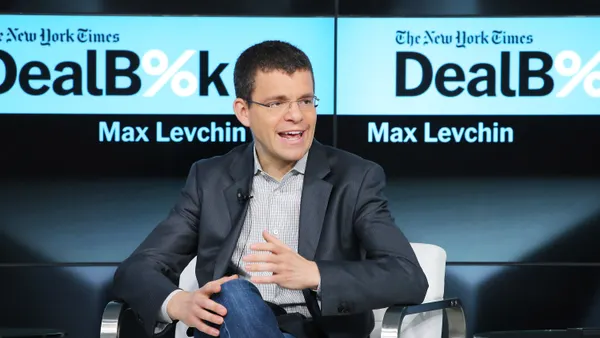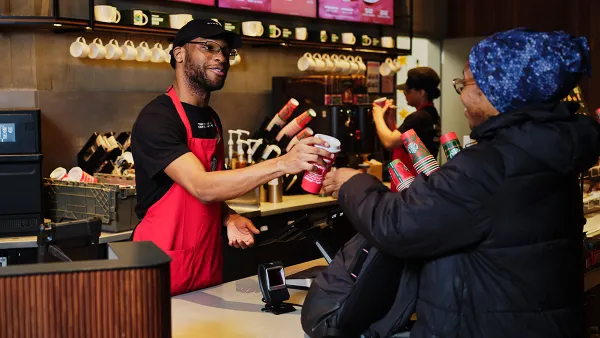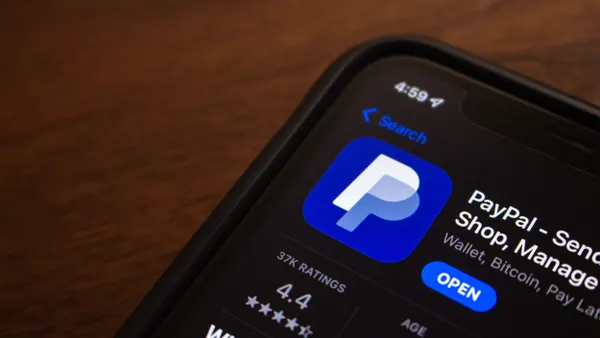Payment processing giants Fiserv, Stripe and Block stand to save money from their embrace of cryptocurrencies, according to consultants and analysts who follow the payments industry.
All three companies have announced ventures into digital assets in recent months.
While Block said it would help merchants accept Bitcoin, Fiserv and Stripe both plan to delve into stablecoins, which are cryptocurrencies pegged to the value of a fiat currency like the dollar. Those ties theoretically help them hold their value better than more volatile assets like Bitcoin or Dogecoin.
Stripe, for example, announced last week that it was launching a platform to let customers pay for subscriptions with stablecoins.
All the efforts to integrate digital currencies follows President Donald Trump’s signing of the Genius Act in July, creating a regulatory framework for stablecoins.
Letting merchants accept crypto payments potentially cuts some players like banks and credit card networks out of the process, because the customer can simply send a digital currency directly to the merchant, said James Stevens, a partner at the law firm Troutman Pepper Locke who follows the payments industry.
“There continues to be attempts to grow forms of payment that may result in [lower] transaction costs,” he said in an interview.
Merchants pay fees that are a percentage of each credit and debit card purchase to a variety of entities, including bank card issuers, processors and the card networks. The average credit card interchange fee is about 2.2%, according to the Nilson Report.
Fewer companies taking a cut means more money left for processors and their merchant customers, Tony DeSanctis, senior director of payments for the consulting firm Cornerstone Advisors, said in an email.
“This is about the potential to provide merchants with another low-cost routing option,” he said.
However, adoption of these cryptocurrencies remains a challenge, said Bill Maurer, the director of the University of California Irvine’s Institute for Money, Technology and Financial Inclusion.
“The jury is still out on what all this is going to mean,” he said. Customers aren’t clamoring for it, and it’s not yet clear if cryptocurrency payments are better than other payment methods, Maurer added.
A disclaimer near the end of Block’s news release detailing plans for its seller service provider Square’s plans to let merchants accept Bitcoin says the transactions are irreversible and may occasionally experience delays or technical issues.
Fiserv’s interest in stablecoins is consistent with the multiple ways the payment processor already moves money, Sunil Sachdev, the company’s head of embedded finance and digital assets said in an emailed statement.
“The use cases enabled by stablecoins will bring forward different customer and commercial value propositions which unlock efficiency and new revenue opportunities for all parties in the ecosystem,” the statement said.
Spokespeople for Stripe and Block did not respond to requests for comment.
However, consumer use of cryptocurrency for payments was on the decline in the past few years, according to a Federal Reserve Bank of Kansas City report last month. That’s despite digital assets continuing to make headlines
“Fiserv is the most interesting because that’s the one thinking about it in terms of infrastructure,” Maurer said.
The Milwaukee-based company said earlier this month that it is working with the state-owned Bank of North Dakota to offer the “Roughrider” stablecoin — in addition to its own FIUSD stablecoin — sometime next year.
The digital currencies will be used to move money between banks and between countries, the company said in a news release announcing the Roughrider coin. Integrating the digital assets into the company’s payment infrastructure that way may give Fiserv’s stablecoins more staying power, Maurer said.
In an announcement earlier this month, detailing new services including Bitcoin payments, Block said it could offer discounts to merchants who use crypto. One merchant — Compass Coffee in Washington D.C. — demonstrated last week how a Square point-of-sale terminal could be used to let a customer pay with the digital currency.
Square is “offering no transaction costs for a period of time, and then a very low transaction cost,” Stevens said.
Those offers are consistent with two recent payments trends, he said, offering more ways to settle transactions and finding ways to reduce costs for both merchants and processors.
While merchants may benefit from the use of digital currencies, payment processors are unlikely to pass any of their savings on to consumers, Maurer stressed.
While developments like the will support crypto use in the short term, he remains unconvinced that crypto has staying power.













